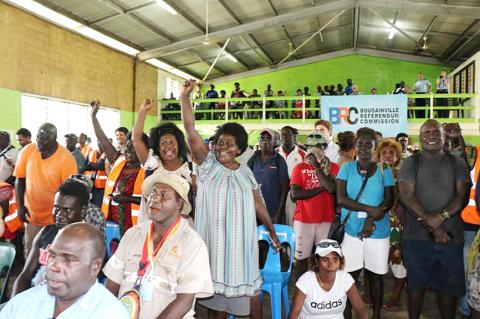Voters backing Bougainville’s independence from Papua New Guinea have won a landslide referendum victory, according to results released yesterday — a major step toward the troubled isles becoming the world’s newest nation.
Chairman of the Bougainville Referendum Commission Bertie Ahern declared that 176,928 people — about 98 percent of voters — had backed independence, with just 3,043 supporting the option of remaining part of Papua New Guinea with more autonomy.
The announcement prompted loud cheers, applause and tears as dignitaries burst into song, with strains of the islands’ anthem My Bougainville ringing out.

Photo: AP
“Happy is an understatement” nursing graduate Alexia Baria told reporters. “You see my tears, this is the moment we have been waiting for.”
The historic vote caps a decades-long peace process and a long recovery from a brutal civil war between Bougainville rebels, Papua New Guinean security forces and foreign mercenaries that ended in 1998 and left up to 20,000 people dead — 10 percent of the population.
“Now, at least psychologically, we feel liberated,” said John Momis, the priest-turned-leader of the autonomous region’s government.
However, independence would not be immediate, a long political process lies ahead and leaders face formidable financial and administrative challenges to turn a cluster of poor Pacific islands into a fully fledged nation.
The result must first be ratified by Papua New Guinea’s parliament — where there is opposition to the move for fear it might spark other independence movements in a nation defined by disparate linguistic and tribal groups.
However, the scale of the victory for the pro-independence side would heap pressure on Port Moresby to endorse the outcome.
“There’s no misinterpreting this result — Bougainville wants independence” said Shane McLeod of Sydney’s Lowy Institute. “The strength of the vote would seem to make it all but inevitable.”
“Port Moresby will need to quickly digest the result,” he said. “They’ll need to be ready to talk about the timetable for independence.”
Speaking in Buka, Papua New Guinea, Ahern urged all sides to recognize a vote that was about “your peace, your history and your future,” and showed “the power of the pen over weapons.”
Papua New Guinean Minister for Bougainville Affairs Puka Temu said “the outcome is a credible one,” but asked that voters “allow the rest of Papua New Guinea sufficient time to absorb this result.”
In stark contrast to past internecine bloodshed, voting began on Nov. 23 with ecstatic residents — some festooned in grass garlands — forming makeshift choirs that stomped through the streets, waving independence flags, blowing bamboo pipes and chanting in chorus.
The vote ended on Saturday and according to the Bougainville Referendum Commission it passed off without major incident.
Many Bougainvilleans were realistic about the difficulties ahead.
Gerald Dising, a store owner who traveled from the far south of Bougainville to witness the result, described it as a “first hurdle” being passed.
Politicians “now have a huge task to implement the wishes of our people,” he said.

Yemen’s separatist leader has vowed to keep working for an independent state in the country’s south, in his first social media post since he disappeared earlier this month after his group briefly seized swathes of territory. Aidarous al-Zubaidi’s United Arab Emirates (UAE)-backed Southern Transitional Council (STC) forces last month captured two Yemeni provinces in an offensive that was rolled back by Saudi strikes and Riyadh’s allied forces on the ground. Al-Zubaidi then disappeared after he failed to board a flight to Riyadh for talks earlier this month, with Saudi Arabia accusing him of fleeing to Abu Dhabi, while supporters insisted he was

‘SHOCK TACTIC’: The dismissal of Yang mirrors past cases such as Jang Song-thaek, Kim’s uncle, who was executed after being accused of plotting to overthrow his nephew North Korean leader Kim Jong-un has fired his vice premier, compared him to a goat and railed against “incompetent” officials, state media reported yesterday, in a rare and very public broadside against apparatchiks at the opening of a critical factory. Vice Premier Yang Sung-ho was sacked “on the spot,” the state-run Korean Central News Agency said, in a speech in which Kim attacked “irresponsible, rude and incompetent leading officials.” “Please, comrade vice premier, resign by yourself when you can do it on your own before it is too late,” Kim reportedly said. “He is ineligible for an important duty. Put simply, it was

The Chinese Embassy in Manila yesterday said it has filed a diplomatic protest against a Philippine Coast Guard spokesman over a social media post that included cartoonish images of Chinese President Xi Jinping (習近平). Philippine Coast Guard spokesman Jay Tarriela and an embassy official had been trading barbs since last week over issues concerning the disputed South China Sea. The crucial waterway, which Beijing claims historic rights to despite an international ruling that its assertion has no legal basis, has been the site of repeated clashes between Chinese and Philippine vessels. Tarriela’s Facebook post on Wednesday included a photo of him giving a

Syrian President Ahmed al-Sharaa on Sunday announced a deal with the chief of Kurdish-led forces that includes a ceasefire, after government troops advanced across Kurdish-held areas of the country’s north and east. Syrian Kurdish leader Mazloum Abdi said he had agreed to the deal to avoid a broader war. He made the decision after deadly clashes in the Syrian city of Raqa on Sunday between Kurdish-led forces and local fighters loyal to Damascus, and fighting this month between the Kurds and government forces. The agreement would also see the Kurdish administration and forces integrate into the state after months of stalled negotiations on